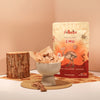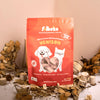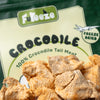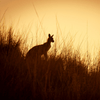Ethical Harvesting Practices
- by Fureeze Pet Treats
Fureeze Ethical Harvesting Practices In Tasmania
There's no doubt that the consumption of wildlife, such as wallaby, can be a very sensitive topic to discuss. Fureeze sources almost 100% of its ingredients from Tasmania, excluding products like crocodile, as they are not native to Tasmania.
If you've travelled from mainland Australia to Tasmania, you would've noticed in the Tasmanian airport that certain fruits, veggies and animal products cannot be brought in. This is because Tasmania has its own separate eco-system from the mainland.
Tasmania, known for its remarkable biodiversity, is home to species like Bennett’s wallaby and brushtail possum, which play essential roles in its unique ecosystem. However, unlike mainland Australia, Tasmania's isolated ecosystem requires careful management to prevent issues such as overgrazing, agricultural losses, and ecological imbalances caused by wildlife population surges.
In this blog, we’ll briefly talk about the process and logic behind the wildlife monitoring, why they are essential, and what efforts are made to ensure that animal welfare and sustainability remain at the forefront.
The Importance of Population Monitoring
Since 1975, NRE Tas has conducted annual spotlight surveys to monitor the populations of key species (NRE Tas Wildlife Management). These surveys are necessary for detecting trends, assessing the impact of environmental factors, and determining whether intervention is needed.
When it comes to population monitoring, its not simply just guesses and assumptions. Scientist and biologists work together to make Data-backed decisions. For example on Maria Island, over 750 wallabies and pademelons were humanely culled after research showed they were causing severe overgrazing, threatening both native flora and the long-term survival of other wildlife species. While this might seem illogical, it is a carefully considered measure to protect the broader ecosystem.
Humane Practices in Wildlife Management
One of the biggest concerns for many activists is the welfare of animals involved in population control programmes. The Tasmanian government has addressed these concerns by implementing strict animal welfare guidelines.
For instance, the Animal Welfare Guidelines for Brushtail Possums provide clear instructions on humane capture, handling, and euthanasia techniques (Animal Welfare Guidelines for Brushtail Possums). Similarly, the Code of Practice for Fallow Deer ensures that all actions are carried out with minimal stress to the animals (Code of Practice for Fallow Deer). In Tasmania, the government audits our suppliers on an annual basis, making sure the hunters can give wildlife an instantaneous death by using a high-powered calibre round.
Turning Challenges into Opportunities
Tasmania has pioneered innovative ways to sustainably manage wildlife populations. One of our suppliers such as Lenah Game Meats is a perfect example of how challenges can be turned into opportunities. Operating under strict government regulation, Lenah harvests wild wallabies and possums in a manner that ensures population health and ecological balance (Lenah Sustainability).
Their zero-waste philosophy ensures that no part of the animal goes unused. Meat is sold as a sustainable protein source, while pelts are used for high-quality fur products. This model not only reduces waste but also supports local economies and provides consumers with environmentally responsible options.
Environmental Benefits of Non-Farmed Meat (wallaby etc.)
If you're looking for a sustainable protein source, wallaby meat stands out as a top contender. Unlike traditional livestock such as cattle or sheep, wallabies produce almost no methane—a major greenhouse gas. According to research, wallaby meat has a carbon footprint of just 2.39 kg CO2-equivalent per kilogram, significantly lower than beef or lamb.
Choosing wallaby meat isn't just good for the planet—it also helps manage populations that, if left unchecked, could cause environmental harm. By supporting products like these, consumers contribute to a more sustainable food system.
Addressing Concerns About Culling
It’s understandable that some people feel uneasy about wildlife culling, but it’s important to view the issue through the lens of ecological balance. Overpopulation of species like wallabies and possums can have devastating effects, including:
- Habitat Destruction: Overgrazing can lead to soil erosion and the loss of native vegetation, which impacts other wildlife that depends on these plants.
- Agricultural Losses: Farmers often suffer from significant crop damage, threatening their livelihoods (NRE Tas Wildlife Management).
- Biodiversity Decline: When one species dominates, it can outcompete others, leading to a loss of diversity in the ecosystem.
Programmes like those implemented in Tasmania ensure that such interventions are based on sound science, conducted humanely, and designed to minimise impact while achieving ecological balance.
How Can You Support Sustainable Wildlife Management?
If you’re concerned about the ethics of wildlife management, there are ways you can support responsible practices:
- Choose Sustainably Sourced Products: Opt for meat and other products from companies like Lenah that prioritise sustainability and humane practices.
- Educate Yourself: Understanding the reasons behind these management strategies can help you make informed opinions and decisions.
- Support Conservation Programmes: Many organisations work to protect Tasmania’s biodiversity, and your support can help them achieve their goals.
- Switch to Fureeze Pet Treats: 100% of our products are ethically sourced from local farmers and suppliers.
A Delicate Balance
Tasmania’s method of managing wildlife showcases the complexity of such issues. It goes beyond safeguarding crops or controlling numbers—it’s about maintaining the delicate balance of life that sustains us all. By embracing transparency, thorough research, and humane strategies, Tasmania demonstrates a thoughtful way to tackle ecological challenges while upholding ethical values.
When you choose Fureeze, you’re backing local Australian farms and enterprises while playing a part in promoting a thriving ecosystem.





